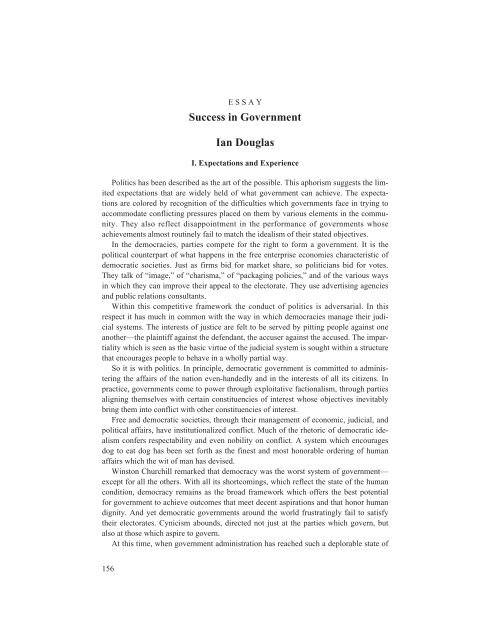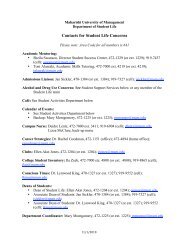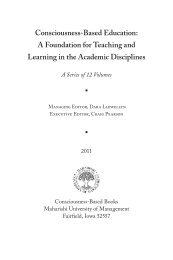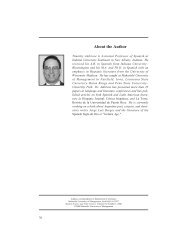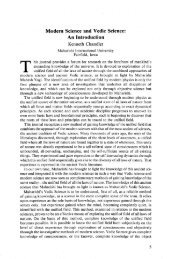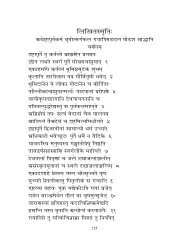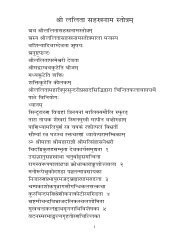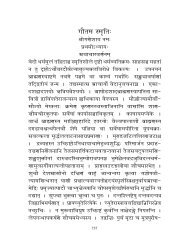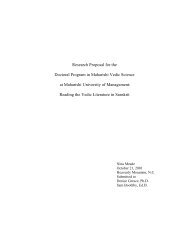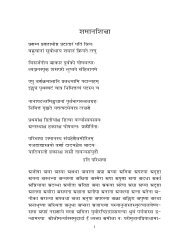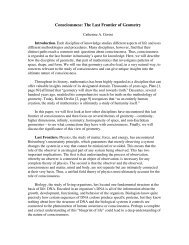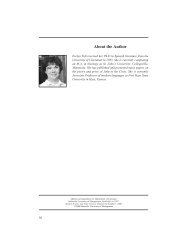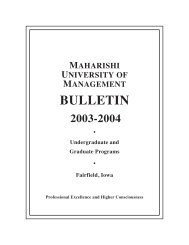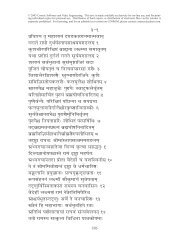Success in Government - Maharishi University of Management
Success in Government - Maharishi University of Management
Success in Government - Maharishi University of Management
Create successful ePaper yourself
Turn your PDF publications into a flip-book with our unique Google optimized e-Paper software.
156<br />
ESSAY<br />
<strong>Success</strong> <strong>in</strong> <strong>Government</strong><br />
Ian Douglas<br />
I. Expectations and Experience<br />
Politics has been described as the art <strong>of</strong> the possible. This aphorism suggests the limited<br />
expectations that are widely held <strong>of</strong> what government can achieve. The expectations<br />
are colored by recognition <strong>of</strong> the difficulties which governments face <strong>in</strong> try<strong>in</strong>g to<br />
accommodate conflict<strong>in</strong>g pressures placed on them by various elements <strong>in</strong> the community.<br />
They also reflect disappo<strong>in</strong>tment <strong>in</strong> the performance <strong>of</strong> governments whose<br />
achievements almost rout<strong>in</strong>ely fail to match the idealism <strong>of</strong> their stated objectives.<br />
In the democracies, parties compete for the right to form a government. It is the<br />
political counterpart <strong>of</strong> what happens <strong>in</strong> the free enterprise economies characteristic <strong>of</strong><br />
democratic societies. Just as firms bid for market share, so politicians bid for votes.<br />
They talk <strong>of</strong> “image,” <strong>of</strong> “charisma,” <strong>of</strong> “packag<strong>in</strong>g policies,” and <strong>of</strong> the various ways<br />
<strong>in</strong> which they can improve their appeal to the electorate. They use advertis<strong>in</strong>g agencies<br />
and public relations consultants.<br />
With<strong>in</strong> this competitive framework the conduct <strong>of</strong> politics is adversarial. In this<br />
respect it has much <strong>in</strong> common with the way <strong>in</strong> which democracies manage their judicial<br />
systems. The <strong>in</strong>terests <strong>of</strong> justice are felt to be served by pitt<strong>in</strong>g people aga<strong>in</strong>st one<br />
another—the pla<strong>in</strong>tiff aga<strong>in</strong>st the defendant, the accuser aga<strong>in</strong>st the accused. The impartiality<br />
which is seen as the basic virtue <strong>of</strong> the judicial system is sought with<strong>in</strong> a structure<br />
that encourages people to behave <strong>in</strong> a wholly partial way.<br />
So it is with politics. In pr<strong>in</strong>ciple, democratic government is committed to adm<strong>in</strong>ister<strong>in</strong>g<br />
the affairs <strong>of</strong> the nation even-handedly and <strong>in</strong> the <strong>in</strong>terests <strong>of</strong> all its citizens. In<br />
practice, governments come to power through exploitative factionalism, through parties<br />
align<strong>in</strong>g themselves with certa<strong>in</strong> constituencies <strong>of</strong> <strong>in</strong>terest whose objectives <strong>in</strong>evitably<br />
br<strong>in</strong>g them <strong>in</strong>to conflict with other constituencies <strong>of</strong> <strong>in</strong>terest.<br />
Free and democratic societies, through their management <strong>of</strong> economic, judicial, and<br />
political affairs, have <strong>in</strong>stitutionalized conflict. Much <strong>of</strong> the rhetoric <strong>of</strong> democratic idealism<br />
confers respectability and even nobility on conflict. A system which encourages<br />
dog to eat dog has been set forth as the f<strong>in</strong>est and most honorable order<strong>in</strong>g <strong>of</strong> human<br />
affairs which the wit <strong>of</strong> man has devised.<br />
W<strong>in</strong>ston Churchill remarked that democracy was the worst system <strong>of</strong> government—<br />
except for all the others. With all its shortcom<strong>in</strong>gs, which reflect the state <strong>of</strong> the human<br />
condition, democracy rema<strong>in</strong>s as the broad framework which <strong>of</strong>fers the best potential<br />
for government to achieve outcomes that meet decent aspirations and that honor human<br />
dignity. And yet democratic governments around the world frustrat<strong>in</strong>gly fail to satisfy<br />
their electorates. Cynicism abounds, directed not just at the parties which govern, but<br />
also at those which aspire to govern.<br />
At this time, when government adm<strong>in</strong>istration has reached such a deplorable state <strong>of</strong>
SUCCESS IN GOVERNMENT<br />
failure, the knowledge exists to create a national government capable <strong>of</strong> satisfy<strong>in</strong>g<br />
everyone. This knowledge has been formulated by <strong>Maharishi</strong> Mahesh Yogi from the<br />
Vedic tradition <strong>of</strong> knowledge as his Absolute Theory <strong>of</strong> <strong>Government</strong>. Central to<br />
<strong>Maharishi</strong>’s Absolute Theory <strong>of</strong> <strong>Government</strong> is his <strong>in</strong>sight that governments reflect the<br />
level <strong>of</strong> consciousness <strong>of</strong> their communities.<br />
<strong>Government</strong> is the pure and <strong>in</strong>nocent mirror <strong>of</strong> the nation, faithfully reflect<strong>in</strong>g whatever is<br />
presented to it. (<strong>Maharishi</strong> Mahesh Yogi, 1992, p. 47)<br />
<strong>Government</strong>s cannot rise above the level <strong>of</strong> national consciousness—the collective<br />
consciousness <strong>of</strong> all the <strong>in</strong>dividuals <strong>of</strong> the nation—no matter how idealistic their objectives<br />
may be. (Please refer to Orme-Johnson and Dillbeck, 1987, for a detailed description<br />
<strong>of</strong> <strong>Maharishi</strong>’s pr<strong>in</strong>ciples <strong>of</strong> collective consciousness.) Unless the consciousness <strong>of</strong><br />
communities and nations is changed, their governments will not be able to improve on<br />
their present undist<strong>in</strong>guished and <strong>of</strong>ten disastrous standards <strong>of</strong> performance.<br />
In his Absolute Theory <strong>of</strong> <strong>Government</strong> <strong>Maharishi</strong> presents knowledge and technologies<br />
by which every government can adm<strong>in</strong>ister the nation with the same orderl<strong>in</strong>ess<br />
and efficiency with which nature adm<strong>in</strong>isters the entire universe without a problem.<br />
<strong>Maharishi</strong> describes his Transcendental Meditation and TM-Sidhi program as technologies<br />
<strong>of</strong> consciousness which easily and effortlessly align <strong>in</strong>dividual awareness with the<br />
total potential <strong>of</strong> natural law located <strong>in</strong> the simplest form <strong>of</strong> human awareness, spontaneously<br />
br<strong>in</strong>g<strong>in</strong>g all thought and action <strong>in</strong>to accord with natural law. When the collective<br />
practice <strong>of</strong> these technologies br<strong>in</strong>gs the collective consciousness <strong>of</strong> the nation <strong>in</strong><br />
tune with natural law, then violation <strong>of</strong> natural law, the cause <strong>of</strong> all problems <strong>in</strong> <strong>in</strong>dividual<br />
and collective life, has been shown to significantly decrease and life is spontaneously<br />
lived <strong>in</strong> an evolutionary direction—ultimately <strong>in</strong> complete harmony, orderl<strong>in</strong>ess and<br />
progress.<br />
This monograph looks at how perfect government can be achieved—at how what<br />
may seem to be a fanciful utopian dream can be realized with absolute certa<strong>in</strong>ty. It discusses<br />
basic problems <strong>in</strong> government adm<strong>in</strong>istration: reliance on economic policy,<br />
stress <strong>in</strong> collective consciousness, and conflict-driven political activity. It locates the<br />
basis <strong>of</strong> these problems <strong>in</strong> the collective consciousness <strong>of</strong> the nation which is not <strong>in</strong> tune<br />
with natural law, and it presents the knowledge and technologies <strong>of</strong> <strong>Maharishi</strong>’s<br />
Absolute Theory <strong>of</strong> <strong>Government</strong> by which perfect government can be achieved.<br />
This knowledge <strong>in</strong>volves what may <strong>in</strong>itially seem to be an unlikely <strong>in</strong>terconnection<br />
between work <strong>in</strong> the unified field theory <strong>of</strong> quantum physics and the knowledge <strong>of</strong> consciousness<br />
from the Vedic tradition as brought to light by <strong>Maharishi</strong>. These two scientific<br />
streams com<strong>in</strong>g respectively from the most recent f<strong>in</strong>d<strong>in</strong>gs <strong>in</strong> modern physics and<br />
from the oldest scientific tradition <strong>in</strong> history provide the underp<strong>in</strong>n<strong>in</strong>g for the changes<br />
that will revolutionize the art <strong>of</strong> government. The achievement <strong>of</strong> this remarkable correlation<br />
is <strong>Maharishi</strong>’s work, which has been to <strong>in</strong>tegrate modern scientific knowledge<br />
and methods with those <strong>of</strong> ancient Vedic science. His study <strong>of</strong> the Vedic literature and<br />
<strong>in</strong>terpretation <strong>of</strong> important aspects <strong>of</strong> the understand<strong>in</strong>g <strong>of</strong> consciousness which had<br />
been misconstrued over millennia led to the development <strong>of</strong> the Transcendental<br />
Meditation and TM-Sidhi program, practical and proven technologies which elim<strong>in</strong>ate<br />
157
MODERN SCIENCE AND VEDIC SCIENCE<br />
stress and br<strong>in</strong>g life <strong>in</strong>to alignment with natural law.<br />
<strong>Maharishi</strong> (1986) expla<strong>in</strong>s that no government has been able to satisfy all its people<br />
because all have lacked the knowledge and ability to handle the nation as a whole.<br />
<strong>Maharishi</strong> po<strong>in</strong>ts out that everyth<strong>in</strong>g <strong>in</strong> the world is basically governed by natural law.<br />
Therefore, natural law is that one element which can be utilized to <strong>in</strong>fluence all <strong>in</strong>dividuals<br />
and all nations simultaneously. The holistic value <strong>of</strong> natural law has been glimpsed<br />
by modern physics as a s<strong>in</strong>gle unified field at the basis <strong>of</strong> nature’s function<strong>in</strong>g. Vedic<br />
Science has long known <strong>of</strong> the existence <strong>of</strong> this unified field <strong>of</strong> natural law as a field <strong>of</strong><br />
consciousness. Only by mak<strong>in</strong>g use <strong>of</strong> the holistic value <strong>of</strong> natural law available <strong>in</strong> the<br />
unified field <strong>of</strong> natural law which governs the whole universe can the whole <strong>of</strong> the<br />
nation be handled (<strong>Maharishi</strong> Mahesh Yogi, 1986, 1992).<br />
Vedic scientists have, throughout their tradition, understood and directly experienced<br />
the unmanifest existence <strong>of</strong> a s<strong>in</strong>gle, self-<strong>in</strong>teract<strong>in</strong>g field <strong>of</strong> pure <strong>in</strong>telligence or pure<br />
consciousness at the foundation <strong>of</strong> all the laws <strong>of</strong> nature. <strong>Maharishi</strong> (1980) emphasizes:<br />
The whole <strong>of</strong> nature is automatically governed, it cannot just go on without any basis <strong>of</strong><br />
organiz<strong>in</strong>g ability. . . . From this we f<strong>in</strong>d at the basis <strong>of</strong> all creation an element—consciousness,<br />
<strong>in</strong>telligence—which can function from with<strong>in</strong> itself and which has <strong>in</strong>f<strong>in</strong>ite organiz<strong>in</strong>g<br />
power. This element must be a field <strong>of</strong> all possibilities, it must be the totality <strong>of</strong> natural<br />
law. (p. 11.<br />
Quantum physicists <strong>in</strong> our time have also come to the conclusion that the unified<br />
field is a field <strong>of</strong> pure <strong>in</strong>telligence (Please refer to Hagel<strong>in</strong>, 1987 for a discussion <strong>of</strong> the<br />
unified field <strong>of</strong> natural law as a field <strong>of</strong> consciousness from a physicist’s perspective.)<br />
The confluence <strong>of</strong> these two scientific streams has given the world its most significant<br />
scientific advance—the capacity benignly and effortlessly to change social behavior<br />
and to elim<strong>in</strong>ate negative tendencies from national life and from <strong>in</strong>ternational relationships.<br />
Any government can make use <strong>of</strong> the unified field <strong>of</strong> natural law to create an<br />
<strong>in</strong>tegrated and harmonious national consciousness. <strong>Maharishi</strong>’s technologies <strong>of</strong> consciousness—the<br />
Transcendental Meditation and TM-Sidhi program—through which<br />
this capacity is applied, give to governments the ability to elim<strong>in</strong>ate problems and to<br />
effect positive change far beyond anyth<strong>in</strong>g that has hitherto been available to them.<br />
II. Current Problems <strong>in</strong> <strong>Government</strong> Adm<strong>in</strong>istration<br />
A. Reliance on Economic Policy<br />
Recent years have seen a widespread and grow<strong>in</strong>g disillusionment with politicians <strong>in</strong><br />
the democracies. It might have been thought that, with the collapse <strong>of</strong> totalitarian communism<br />
<strong>in</strong> Europe and grow<strong>in</strong>g pressure on it elsewhere, democracy would have been<br />
rid<strong>in</strong>g high. Many <strong>in</strong> the West were ready to claim these huge changes <strong>in</strong> the <strong>in</strong>ternational<br />
order as a victory for democracy.<br />
But the celebrations have been short-lived. The ostensible victor is now <strong>in</strong> real trouble.<br />
The pressure under which European communism collapsed seems to be apply<strong>in</strong>g its<br />
weight to all other political structures, <strong>in</strong>clud<strong>in</strong>g democracy. Western democracy has<br />
158
SUCCESS IN GOVERNMENT<br />
always claimed the high moral ground, but now it is on the defensive <strong>in</strong> country after<br />
country.<br />
The global sweep <strong>of</strong> this phenomenon logically can be expla<strong>in</strong>ed only by see<strong>in</strong>g it as<br />
evidence <strong>of</strong> a change <strong>in</strong> global consciousness—a major transition from one phase to<br />
another. This transition has been achieved by the ris<strong>in</strong>g purity and coherence <strong>in</strong> collective<br />
consciousness generated by over four million meditators whose daily practice <strong>of</strong> the<br />
<strong>Maharishi</strong>’s Transcendental Meditation and TM-Sidhi program (particularly the group<br />
practice <strong>of</strong> these programs which will be discussed <strong>in</strong> a later section) has been neutraliz<strong>in</strong>g<br />
stress <strong>in</strong> collective consciousness (<strong>Maharishi</strong>, 1986; <strong>Maharishi</strong> International<br />
<strong>University</strong>, 1990; Institute <strong>of</strong> World Peace, 1992).<br />
<strong>Government</strong>s are struggl<strong>in</strong>g <strong>in</strong> the face <strong>of</strong> this change because they do not understand<br />
the nature <strong>of</strong> what is happen<strong>in</strong>g with<strong>in</strong> their countries and around the world. As a<br />
result <strong>of</strong> this lack <strong>of</strong> understand<strong>in</strong>g, governments try to cope with their problems on the<br />
wrong level and with predictable lack <strong>of</strong> success overall. For a time their efforts might<br />
appear to bear fruit <strong>in</strong> one or more areas <strong>of</strong> adm<strong>in</strong>istration, but at the expense <strong>of</strong> what is<br />
happen<strong>in</strong>g elsewhere. The economy improves while social distress rema<strong>in</strong>s high. Or<br />
social pressures are ameliorated by pour<strong>in</strong>g money <strong>in</strong>to social assistance, but at a level<br />
that the economy cannot susta<strong>in</strong>. There is a lack <strong>of</strong> balance <strong>in</strong> what government can<br />
achieve and as a result people rema<strong>in</strong> frustrated and dissatisfied.<br />
<strong>Government</strong>s give primacy to economic policy. The conventional wisdom is that if<br />
the economy is put onto a sound basis so that susta<strong>in</strong>able economic growth can be<br />
enjoyed, then problems <strong>in</strong> other areas will become manageable. Social distress will be<br />
reduced and hopefully elim<strong>in</strong>ated when people have jobs and have money <strong>in</strong> their pockets.<br />
Health will improve because people will be able to afford medical care. Crime will<br />
reduce because people will not need to steal to survive, and their stress levels will be<br />
lowered when they are employed and earn<strong>in</strong>g enough to make them comfortable. And<br />
for those few who cont<strong>in</strong>ue to be disadvantaged with<strong>in</strong> this happy scene, government<br />
will be able to provide care and support because a healthy economy will give it the fiscal<br />
resources which it needs to do so.<br />
This is the theory implicit <strong>in</strong> the behavior and the rhetoric <strong>of</strong> politicians. It seems to<br />
be common to all “ma<strong>in</strong>stream” parties, whose presentation <strong>of</strong> the theory differs among<br />
them only marg<strong>in</strong>ally, notwithstand<strong>in</strong>g the extravagance with which these differences<br />
tend to be portrayed, especially at election time.<br />
The experience belies the theory. While a soundly work<strong>in</strong>g economy is obviously<br />
desirable, it is not some master key which opens the door to fulfillment <strong>in</strong> all other areas<br />
<strong>of</strong> society—or even any other s<strong>in</strong>gle area. Japan has been regarded as a model <strong>of</strong> economic<br />
efficiency, but its youth suicide rate is one <strong>of</strong> the world’s highest and overall<br />
there is a very limited capacity <strong>of</strong> its people to enjoy their affluence. Another wealthy<br />
society which has also been seen as a paragon <strong>of</strong> economic efficiency is Switzerland.<br />
The Swiss have one <strong>of</strong> the West’s most serious drug problems and a high <strong>in</strong>cidence <strong>of</strong><br />
AIDS. These are but two <strong>in</strong>stances <strong>of</strong> societies under great stress notwithstand<strong>in</strong>g their<br />
economic achievements. It is not credible, <strong>in</strong> look<strong>in</strong>g at the <strong>in</strong>ternational evidence, to<br />
ma<strong>in</strong>ta<strong>in</strong> this purported l<strong>in</strong>kage between economic efficiency and the broad fulfillment<br />
<strong>of</strong> a nation’s people. And yet politicians cont<strong>in</strong>ue to behave as though the connection<br />
159
MODERN SCIENCE AND VEDIC SCIENCE<br />
were unarguable.<br />
The preoccupation with economic policy leads to endless debate nationally and <strong>in</strong>ternationally<br />
about particular economic schools <strong>of</strong> thought. Neo-Keynesians vie with neoclassicists,<br />
proponents <strong>of</strong> <strong>in</strong>terventionism with free market theorists. Economic gurus<br />
move <strong>in</strong> and out <strong>of</strong> fashion. When one chosen approach to economic management fails<br />
to deliver satisfaction, an alternative approach is embraced, <strong>of</strong>ten with a messianic fervor<br />
about the splendid outcomes that it will allegedly deliver. Economic debate <strong>in</strong> the<br />
20th century, with its <strong>in</strong>tensity and <strong>in</strong>tolerance, is not dissimilar to the acrimonious religious<br />
tractarianism <strong>of</strong> 16th and 17th century Europe.<br />
Politicians caught up <strong>in</strong> the economic policy arguments <strong>of</strong>ten look for exemplars<br />
among other countries to argue that they represent models which their own country<br />
should be follow<strong>in</strong>g. The economic grass seems to look greener on the other side <strong>of</strong> the<br />
fence. The media, the <strong>in</strong>ternational literature and argumentation from parliamentary<br />
debat<strong>in</strong>g chambers and university cloisters to buses and bars all go round and round <strong>in</strong><br />
the search <strong>of</strong> optimal direction.<br />
It does not seem to occur to the political and other constituencies <strong>in</strong>volved <strong>in</strong> this tortured<br />
exercise that their basic premise may be wrong. Given their repeated failure to<br />
f<strong>in</strong>d fulfillment through economic prescriptions, one can admire, after a fashion, their<br />
persistence <strong>in</strong> cont<strong>in</strong>u<strong>in</strong>g to worship this clay-footed god, but not their rationality. When<br />
constant endeavor down a particular path <strong>of</strong> action is <strong>in</strong>variably unsuccessful, it suggests<br />
rather pla<strong>in</strong>ly that the approach <strong>in</strong> question is not efficacious.<br />
There are many who challenge the centrality <strong>of</strong> economic policy and they tend to<br />
come from the political left. These are generally people who f<strong>in</strong>d unacceptable the<br />
human cost that so <strong>of</strong>ten seems to be associated with economic change. S<strong>in</strong>ce the world<br />
sharemarket crash <strong>in</strong> 1987, both governments and bus<strong>in</strong>ess <strong>in</strong> many countries have had<br />
to make pa<strong>in</strong>ful adjustments to deal with the consequences <strong>of</strong> over-borrow<strong>in</strong>g prior to<br />
the crash. The suffer<strong>in</strong>g <strong>in</strong>duced by this has been reflected <strong>in</strong> high unemployment levels<br />
and stagnant or decl<strong>in</strong><strong>in</strong>g real <strong>in</strong>comes.<br />
Much <strong>of</strong> the reaction aga<strong>in</strong>st this pa<strong>in</strong> has been expressed <strong>in</strong> a challenge to the primacy<br />
<strong>of</strong> economic agencies with<strong>in</strong> governments. In countries such as Australia and<br />
New Zealand, where economic egalitarianism has been someth<strong>in</strong>g <strong>of</strong> a tradition, there<br />
has been concern that economic policy management has resulted <strong>in</strong> a widen<strong>in</strong>g <strong>of</strong> the<br />
gap between the rich and the poor. Societies are becom<strong>in</strong>g <strong>in</strong>creas<strong>in</strong>gly worried about<br />
the polarization <strong>of</strong> “haves” and “have-nots.”<br />
Economic policy is seen as requir<strong>in</strong>g trade-<strong>of</strong>fs. For every benefit economic policy<br />
seeks to deliver there is a cost to be paid <strong>in</strong> some other area—<strong>of</strong>ten <strong>in</strong> social policy. This<br />
understandably arouses dissatisfaction and, at times, strong hostility. The conventional<br />
approach to government around cab<strong>in</strong>et tables and with<strong>in</strong> parliamentary caucuses is to<br />
horse-trade priorities. Political factors tend to determ<strong>in</strong>e how resources are allocated. It is<br />
a system which is almost guaranteed to produce widespread dissatisfaction because it is<br />
not based on objective rationality or equity. For every w<strong>in</strong>ner, there is a loser.<br />
The conventional view, shared by almost all political parties, is that this k<strong>in</strong>d <strong>of</strong><br />
trade-<strong>of</strong>f is unavoidable. It is seen to be ak<strong>in</strong> to an economic law. Economics is all<br />
about mak<strong>in</strong>g decisions on the allocation <strong>of</strong> scarce resources and, almost by def<strong>in</strong>ition,<br />
160
SUCCESS IN GOVERNMENT<br />
not everybody’s aspirations to use those resources can be satisfied.<br />
It is pert<strong>in</strong>ent to compare this view with the experience <strong>of</strong> nature’s provision po<strong>in</strong>ted<br />
out by <strong>Maharishi</strong> (1992). The natural order, where its laws have not been violated, is<br />
characterized by perfect function<strong>in</strong>g and balance. All basic needs are provided for <strong>in</strong> the<br />
most efficient and economical way. The <strong>in</strong>f<strong>in</strong>ite variety <strong>of</strong> creation reflects order and<br />
balance not just with<strong>in</strong> the <strong>in</strong>dividual created unit, but also <strong>in</strong> the way <strong>in</strong> which that unit<br />
<strong>in</strong>teracts with the rest <strong>of</strong> creation. There is an organiz<strong>in</strong>g power with<strong>in</strong> nature which<br />
supports and ma<strong>in</strong>ta<strong>in</strong>s the evolutionary process <strong>in</strong>fallibly and completely. Noth<strong>in</strong>g is<br />
wasted, noth<strong>in</strong>g misdirected.<br />
Nature’s laws work with complete impartiality. Their benefits are freely available<br />
across the whole <strong>of</strong> creation. For humank<strong>in</strong>d nature’s laws do not discrim<strong>in</strong>ate on ethnic,<br />
socio-economic, religious, gender, or any other grounds. They support all men and<br />
women everywhere.<br />
The political process, on the other hand, chooses its w<strong>in</strong>ners and losers accord<strong>in</strong>g to<br />
the philosophical constructs and the self-<strong>in</strong>terested objectives <strong>of</strong> those <strong>in</strong> power. By its<br />
very character it cannot be impartial and even-handed <strong>in</strong> its delivery <strong>of</strong> benefits.<br />
Because <strong>of</strong> this, and notwithstand<strong>in</strong>g rhetoric which seeks to proclaim otherwise, it has<br />
no basis for true equity <strong>in</strong> its treatment <strong>of</strong> the electorate.<br />
B. Stress <strong>in</strong> Collective Consciousness<br />
Some may argue that it is unrealistic to expect a political system to br<strong>in</strong>g satisfaction<br />
<strong>in</strong>to people’s lives. This, it might be said, is the role <strong>of</strong> religion or <strong>of</strong> education or the<br />
humanities. But all these areas also reflect the community’s or the nation’s level <strong>of</strong> consciousness.<br />
Because the fundamental blockages to the achievement <strong>of</strong> satisfaction lie <strong>in</strong><br />
the realm <strong>of</strong> consciousness—<strong>in</strong>dividual and collective—they can only be dealt with<br />
effectively at that level.<br />
Aga<strong>in</strong>, it might be argued that f<strong>in</strong>d<strong>in</strong>g fulfillment surely is the responsibility <strong>of</strong> the<br />
<strong>in</strong>dividual. It is certa<strong>in</strong>ly true that each <strong>in</strong>dividual, given the simple knowledge by<br />
which to do so, must make the decisions that will lead to his or her own fulfillment. It is<br />
also true that, as stress is removed from <strong>in</strong>dividual consciousness, the collective consciousness<br />
<strong>of</strong> the community or nation benefits accord<strong>in</strong>gly. But what <strong>Maharishi</strong>’s<br />
Absolute Theory <strong>of</strong> <strong>Government</strong> now tells us is that collective consciousness can be<br />
quickly transformed through the technologies <strong>of</strong> the Transcendental Meditation and<br />
TM-Sidhi program which are exponential <strong>in</strong> their effect, so that the process <strong>of</strong> achiev<strong>in</strong>g<br />
societal fulfillment does not rely just on the slow and <strong>in</strong>cremental build-up <strong>of</strong> <strong>in</strong>dividual<br />
experience.<br />
If governments are to succeed <strong>in</strong> br<strong>in</strong>g<strong>in</strong>g together and deliver<strong>in</strong>g policies which<br />
meet the needs <strong>of</strong> their people and satisfy their aspirations, then ways must be found to<br />
reduce and eventually elim<strong>in</strong>ate community stress. The remarkable but very practical<br />
reality is that it is possible to create this vital underp<strong>in</strong>n<strong>in</strong>g <strong>of</strong> successful government.<br />
<strong>Government</strong> has a central role to play <strong>in</strong> the application <strong>of</strong> the technologies <strong>of</strong><br />
<strong>Maharishi</strong>’s Transcendental Meditation and TM-Sidhi program. The promise that they<br />
<strong>of</strong>fer—a promise validated by a large and grow<strong>in</strong>g body <strong>of</strong> scientific research and practical<br />
experience—is that government can become an <strong>in</strong>strument for the renewal <strong>of</strong> soci-<br />
161
MODERN SCIENCE AND VEDIC SCIENCE<br />
ety, for the reduction and removal <strong>of</strong> collective stress, for the effortless achievement <strong>of</strong><br />
social cohesion, <strong>of</strong> vastly improved health, and <strong>of</strong> effective economic performance<br />
reflect<strong>in</strong>g harmony rather than conflict <strong>in</strong> collective consciousness.<br />
C. Conflict-Driven Political Activity<br />
The conflict-centered paradigms which underlie the adm<strong>in</strong>istration <strong>of</strong> government,<br />
judicial procedures, and much economic activity with<strong>in</strong> democratic societies today<br />
reflect community stress. Although community stress obviously represents the aggregate<br />
<strong>of</strong> <strong>in</strong>dividuals’ stress, it has a life and characteristics <strong>of</strong> its own which feed back on<br />
to and <strong>in</strong>tensify stress at the <strong>in</strong>dividual level. This results <strong>in</strong> a vicious cycle <strong>of</strong> negativity<br />
lead<strong>in</strong>g to conflict <strong>in</strong> society.<br />
The totalitarian approach to the issues <strong>of</strong> conflict <strong>in</strong> the body politic is to seek to suppress<br />
opposition by force. In the democracies, opposition is seen as an <strong>in</strong>tegral part <strong>of</strong><br />
the political order and attempts to deal with it are required by the rule <strong>of</strong> law to fall<br />
short <strong>of</strong> the blatantly oppressive. In neither case is the problem <strong>of</strong> conflict effectively<br />
managed. The reason for this failure is that conflict is perceived as be<strong>in</strong>g part <strong>of</strong> the normal<br />
order <strong>of</strong> th<strong>in</strong>gs—someth<strong>in</strong>g which has to be lived with rather than resolved. This<br />
view <strong>of</strong> conflict is at the root <strong>of</strong> the failure to deal with it.<br />
For conflict is not a natural state <strong>of</strong> the human condition. Our discomfort with conflict<br />
is a reflection <strong>of</strong> this. We see it, rightly, as negative and destructive and it sits<br />
unhappily with our consciences. There is a deep human <strong>in</strong>st<strong>in</strong>ct about the unacceptability<br />
<strong>of</strong> conflict which is reflected <strong>in</strong> the sense <strong>of</strong> pleasure that we feel when conflict is settled<br />
and <strong>in</strong> the worry that persists while conflict rema<strong>in</strong>s. Apathy and callousness are<br />
part <strong>of</strong> the avoidance mechanisms used to <strong>in</strong>sulate people aga<strong>in</strong>st the distress caused by<br />
the existence <strong>of</strong> conflict and suffer<strong>in</strong>g but they are poor defenses which impose their<br />
own costs on the mental and moral well-be<strong>in</strong>g <strong>of</strong> those who adopt them.<br />
Conflict <strong>in</strong> society obviously extends far beyond the political processes, but political<br />
conflict serves to fuel conflict at all other levels and to contribute to a situation that then<br />
requires responses from government. Much organized effort goes <strong>in</strong>to deal<strong>in</strong>g with the<br />
consequences <strong>of</strong> conflict and attempt<strong>in</strong>g to reduce its <strong>in</strong>cidence. The cost <strong>in</strong> money and<br />
other resources is huge. The legal structure, the police, and the armed forces are the<br />
most obvious direct costs <strong>of</strong> cop<strong>in</strong>g with conflict. But much <strong>of</strong> health, social services<br />
and educational provision is committed to deal<strong>in</strong>g with conflict and the stress which<br />
underlies it, either <strong>in</strong> reactive or <strong>in</strong> anticipatory mode.<br />
Conflict runs counter to a basic pr<strong>in</strong>ciple <strong>of</strong> nature—the unify<strong>in</strong>g pr<strong>in</strong>ciple. Research<br />
<strong>in</strong> quantum physics, particularly over the past quarter-century, has identified the unified<br />
field as the fundamental state <strong>of</strong> all the laws <strong>of</strong> nature. The basic understand<strong>in</strong>g given<br />
by quantum theory is that the whole <strong>of</strong> creation is the expression <strong>of</strong> underly<strong>in</strong>g universal<br />
fields through which every discrete aspect <strong>of</strong> creation is connected (please refer to<br />
Hagel<strong>in</strong>, 1987).<br />
This connection orig<strong>in</strong>ates at the level <strong>of</strong> the unified field, which theoretical physicists<br />
see as underly<strong>in</strong>g all other quantum fields—gravity, electromagnetism, the strong<br />
<strong>in</strong>teraction field, and the weak <strong>in</strong>teraction field. The movement towards establish<strong>in</strong>g the<br />
existence <strong>of</strong> a s<strong>in</strong>gle unified field was powerfully boosted by the work <strong>of</strong> We<strong>in</strong>berg,<br />
162
SUCCESS IN GOVERNMENT<br />
Salam, and Glashow <strong>in</strong> achiev<strong>in</strong>g a theoretical unification <strong>of</strong> weak and electromagnetic<br />
forces, for which they received the Nobel Prize <strong>in</strong> 1979. S<strong>in</strong>ce then N=8 supergravity<br />
and heterotic superstr<strong>in</strong>g theory have provided a consistent quantum theory <strong>of</strong> gravity<br />
and a framework for the unification <strong>of</strong> all forces and particles <strong>of</strong> nature.<br />
In effect, this work shows that nature is both unify<strong>in</strong>g and diversify<strong>in</strong>g. At one<br />
level—the unmanifest—there is a pr<strong>of</strong>ound underly<strong>in</strong>g unity <strong>in</strong> nature, while at the<br />
other level—the manifest—there is the appearance <strong>of</strong> extreme diversity. It is a logical<br />
<strong>in</strong>ference that, because the dynamics <strong>of</strong> unification are fundamentally vested <strong>in</strong> the unified<br />
field which underlies all creation, while the dynamics <strong>of</strong> diversity stem from excitation<br />
<strong>of</strong> that field and are therefore wholly dependent on it, the unify<strong>in</strong>g pr<strong>in</strong>ciple is the<br />
stronger <strong>of</strong> the two.<br />
Conflict runs counter to this unify<strong>in</strong>g pr<strong>in</strong>ciple. This is the basic reason why conflict<br />
creates suffer<strong>in</strong>g: it is a violation <strong>of</strong> natural law. It follows that political processes which<br />
are rooted <strong>in</strong> conflict must perpetuate suffer<strong>in</strong>g. They are <strong>in</strong>capable <strong>of</strong> br<strong>in</strong>g<strong>in</strong>g satisfaction<br />
to those whom they purport to serve. Enormous energy is expended by political<br />
parties <strong>in</strong> foment<strong>in</strong>g conflict and <strong>in</strong> deal<strong>in</strong>g with its negative implications for themselves.<br />
This is energy which is not directed <strong>in</strong>to positive channels and represents a huge<br />
cost <strong>in</strong> opportunities forgone.<br />
The relentless pursuit <strong>of</strong> adversarial politics is an exercise <strong>in</strong> futility. What is perceived<br />
as “political reality” is, <strong>in</strong> fact, logical absurdity. By def<strong>in</strong>ition, negativity cannot<br />
produce positive outcomes. It is completely unrealistic to expect political processes<br />
which are entrenched <strong>in</strong> negativity to yield policies and government performance which<br />
meet the deeply felt needs <strong>of</strong> people for security, peace, and happ<strong>in</strong>ess. It is like<br />
plant<strong>in</strong>g weeds and expect<strong>in</strong>g prize roses to grow.<br />
The absurdity is tragically compounded by a genu<strong>in</strong>e and widespread belief that<br />
adversarial politics is <strong>in</strong> the best traditions <strong>of</strong> democracy. It is seen as an expression <strong>of</strong><br />
freedom—the freedom <strong>of</strong> people to speak as they will, to uphold any religious, political,<br />
or philosophical belief. Freedom is <strong>in</strong>deed a noble concept, but its benefits cannot be<br />
delivered to people from with<strong>in</strong> a political system which is embedded <strong>in</strong> conflict.<br />
The <strong>in</strong>ability <strong>of</strong> the democratic process to deliver satisfaction to the voters <strong>of</strong> the various<br />
countries has given rise to deep cynicism and frustration. The politicians are aware<br />
<strong>of</strong> the odium <strong>in</strong> which they are held, but ironically they seem to be <strong>in</strong>capable <strong>of</strong> chang<strong>in</strong>g<br />
their behavior. The odium is directed not just at governments, but at alternative governments.<br />
There has probably never been a time when politics was held <strong>in</strong> less regard.<br />
Because behavior with<strong>in</strong> the political systems seems to be impervious to positive<br />
change, notwithstand<strong>in</strong>g the weight <strong>of</strong> discontent with it expressed by the public, there<br />
has been <strong>in</strong> several countries a call to see the systems themselves changed. Italians,<br />
sickened by political and bus<strong>in</strong>ess corruption, have expressed a wish to move from the<br />
system <strong>of</strong> proportional representation which they have had throughout the postwar period<br />
to one much closer to a “first-past-the-post” method <strong>of</strong> elect<strong>in</strong>g parliamentarians.<br />
New Zealanders, frustrated with the behavior <strong>of</strong> their politicians and angered by the<br />
failure to deliver election promises, have <strong>in</strong>dicatively decided that they want to move<br />
from “first-past-the-post” to proportional representation. In each case there is misplaced<br />
confidence that chang<strong>in</strong>g the method <strong>of</strong> elect<strong>in</strong>g governments will produce better gov-<br />
163
MODERN SCIENCE AND VEDIC SCIENCE<br />
ernments.<br />
The problems are much more basic. The conflict-driven political processes <strong>of</strong><br />
today’s democracies will not be reformed by constitutional amendments. Nor are they<br />
amenable to change through preach<strong>in</strong>g and admonition, especially when that admonition<br />
is itself delivered <strong>in</strong> an adversarial context. Change will only come as the problem<br />
is tackled at its source. This means, <strong>in</strong> the first <strong>in</strong>stance, def<strong>in</strong><strong>in</strong>g the problem accurately<br />
and then hav<strong>in</strong>g the capacity to apply an effective solution. The next section looks at<br />
these key issues.<br />
III. The Basis <strong>of</strong> All Problems: Violation <strong>of</strong> Natural Law<br />
We have related <strong>in</strong> the first section <strong>Maharishi</strong>’s explanation that governments are a<br />
reflection <strong>of</strong> the collective consciousness <strong>of</strong> the nation. Incoherence and disharmony <strong>in</strong><br />
national consciousness is the basic reason why governments fail to deliver satisfaction<br />
to their peoples. <strong>Maharishi</strong> (1986) describes this <strong>in</strong>coherence as aris<strong>in</strong>g from violation<br />
<strong>of</strong> natural law.<br />
In recent years especially, we have become very aware <strong>of</strong> the consequences <strong>of</strong> violation<br />
<strong>of</strong> natural law at the level <strong>of</strong> the physical environment—the destruction <strong>of</strong> natural<br />
resources, damage to the ozone layer, the ext<strong>in</strong>ction <strong>of</strong> animal and plant species. The<br />
relationship <strong>of</strong> cause and effect <strong>in</strong> this area is clearly discernible. The same relationship<br />
exists <strong>in</strong> the wider environment <strong>of</strong> social <strong>in</strong>teraction among peoples. Their violation <strong>of</strong><br />
natural law leads to ethnic and national conflict, political division, social tension, crime<br />
and health problems.<br />
In the case <strong>of</strong> the physical environment we readily recognize that the repair <strong>of</strong> damage<br />
and the restoration <strong>of</strong> balance can only be achieved as attitudes and practices are<br />
brought <strong>in</strong>to conformity with nature’s requirements. Clearly, this also applies to the<br />
wider environment, although our recognition <strong>of</strong> this logic is less apparent.<br />
While there is value <strong>in</strong> try<strong>in</strong>g to educate and persuade people about the necessity <strong>of</strong><br />
liv<strong>in</strong>g <strong>in</strong> harmony with natural law, it is an unfortunate reality that this, <strong>of</strong> itself, is not<br />
wholly effective. Environmental groups committed to this approach have succeeded <strong>in</strong><br />
rais<strong>in</strong>g awareness <strong>of</strong> problems and to some degree have catalyzed practical programs to<br />
deal with these problems, but they have a very limited capability to change human<br />
behavior. In the wider environment, churches and other religious agencies, together<br />
with social activists <strong>of</strong> vary<strong>in</strong>g k<strong>in</strong>ds, have likewise struggled to persuade people to<br />
change their attitudes and their ways <strong>of</strong> deal<strong>in</strong>g with one another at all levels. Much <strong>of</strong><br />
this committed and conscientious activity has been an exercise <strong>in</strong> frustration for those<br />
<strong>in</strong>volved.<br />
The key to produc<strong>in</strong>g and susta<strong>in</strong><strong>in</strong>g positive change <strong>in</strong> the total environment is to<br />
allow society to be governed, effortlessly and spontaneously, from the deepest level <strong>of</strong><br />
nature’s function<strong>in</strong>g—the unified field <strong>of</strong> natural law which is a field <strong>of</strong> perfect orderl<strong>in</strong>ess<br />
(<strong>Maharishi</strong>, 1992, 1986). Only from this level can the chaos on the surface be elim<strong>in</strong>ated.<br />
Br<strong>in</strong>g<strong>in</strong>g about such a fundamental change need not <strong>in</strong>volve any physical change <strong>in</strong><br />
the structures <strong>of</strong> government or <strong>in</strong> the way that adm<strong>in</strong>istration is organized. This is not<br />
164
SUCCESS IN GOVERNMENT<br />
where the problem basically lies. Someth<strong>in</strong>g new must be brought <strong>in</strong>to government to<br />
revitalize and enliven the exist<strong>in</strong>g structures and processes. Changes <strong>in</strong> those structures<br />
and processes may naturally follow, but if that happens, it will be an easy and logical<br />
response to the deeper change that is already occurr<strong>in</strong>g.<br />
How is this deeper change to be achieved? It can only come by allow<strong>in</strong>g what<br />
<strong>Maharishi</strong> refers to as the “Constitution <strong>of</strong> the Universe” to become the basis <strong>of</strong> the constitution<br />
<strong>of</strong> the nation and the governance <strong>of</strong> all its affairs. The Constitution <strong>of</strong> the<br />
Universe represents the s<strong>in</strong>gle, universal source <strong>of</strong> all orderl<strong>in</strong>ess <strong>in</strong> creation. <strong>Maharishi</strong><br />
(1992) expla<strong>in</strong>s that just as the constitution <strong>of</strong> a nation conta<strong>in</strong>s the fundamental laws<br />
which govern the whole nation, the Constitution <strong>of</strong> the Universe represents the fundamental<br />
laws <strong>of</strong> nature which adm<strong>in</strong>ister the <strong>in</strong>f<strong>in</strong>ite diversity <strong>of</strong> the universe with perfect<br />
order and without a problem. For a national government to succeed its constitution<br />
must be aligned with the constitution <strong>of</strong> nature’s government—the Constitution <strong>of</strong> the<br />
Universe.<br />
The “Constitution <strong>of</strong> the Universe” is located <strong>in</strong> the unified field <strong>of</strong> natural law.<br />
(<strong>Maharishi</strong> Mahesh Yogi, 1992). The existence and nature <strong>of</strong> the unified field <strong>of</strong> natural<br />
law were recognized and understood many millennia ago by the Vedic scholars <strong>of</strong> India,<br />
who developed the world’s first systematic scientific tradition. <strong>Maharishi</strong> has reformulated<br />
this ancient knowledge and correlated it with the work <strong>of</strong> quantum physicists <strong>in</strong><br />
unified field theory. The outcome has been a fusion <strong>of</strong> historic proportions between<br />
ancient and modern science and confirmation <strong>of</strong> the greatness <strong>of</strong> Vedic scholarship. The<br />
objective approach <strong>of</strong> modern physics has glimpsed the unified field <strong>of</strong> natural law<br />
which was directly experienced by Vedic scientists.<br />
IV. Technologies <strong>of</strong> Consciousness: <strong>Maharishi</strong>’s Transcendental Meditation<br />
and TM-Sidhi Program<br />
The Vedic scientists went further than mere identification <strong>of</strong> the unified field <strong>of</strong> natural<br />
law. Through their subjective approach they were able to develop a technology <strong>of</strong><br />
consciousness which enables men and women to ga<strong>in</strong> access to the unified field <strong>of</strong> pure<br />
consciousness simply and directly.<br />
The exceptional power <strong>of</strong> this technology, delivered through <strong>Maharishi</strong>’s<br />
Transcendental Meditation and TM-Sidhi program, is the more remarkable for the fact<br />
that its application is essentially effortless and requires no additional <strong>in</strong>puts, nor the<br />
exercise <strong>of</strong> any other agency, to transmit its effectiveness. It is a complete technology <strong>of</strong><br />
itself. Noth<strong>in</strong>g else is needed.<br />
These technologies allow the activity <strong>of</strong> the m<strong>in</strong>d to settle down and <strong>in</strong> so do<strong>in</strong>g, the<br />
awareness becomes identified with the deepest level <strong>of</strong> nature’s function<strong>in</strong>g, the unified<br />
field <strong>of</strong> natural law. “With . . . the Transcendental Meditation and TM-Sidhi program,<br />
human awareness is capable <strong>of</strong> function<strong>in</strong>g from that level which is the self-referral<br />
level <strong>of</strong> performance <strong>of</strong> the unified field” (<strong>Maharishi</strong> Mahesh Yogi, 1985, p. 60).<br />
The simple act <strong>of</strong> transcend<strong>in</strong>g thought through Transcendental Meditation and<br />
reach<strong>in</strong>g the unified field <strong>of</strong> pure consciousness br<strong>in</strong>gs an <strong>in</strong>fluence <strong>of</strong> balance and harmony<br />
<strong>in</strong>to the life <strong>of</strong> the person so engaged. When the <strong>in</strong>dividual ga<strong>in</strong>s the ability to<br />
165
MODERN SCIENCE AND VEDIC SCIENCE<br />
function from the self-referral level <strong>of</strong> the unified field <strong>of</strong> natural law, life is spontaneously<br />
lived <strong>in</strong> accord with natural law, free from mistakes and problems (<strong>Maharishi</strong><br />
Mahesh Yogi, 1986).<br />
A very substantial body <strong>of</strong> scientific evidence—more than 500 studies from 200 universities<br />
and research <strong>in</strong>stitutions <strong>in</strong> 30 countries—shows that the regular practice <strong>of</strong> the<br />
Transcendental Meditation and TM-Sidhi program reduces stress and thereby br<strong>in</strong>gs<br />
everyday liv<strong>in</strong>g quite spontaneously more and more <strong>in</strong>to harmony with natural law. It is<br />
an evolutionary process, where the benefits are <strong>in</strong>stantly realizable and progressively<br />
evident. Transferr<strong>in</strong>g these benefits from the <strong>in</strong>dividual to the societal level can be<br />
achieved on an exponential basis, given the field nature <strong>of</strong> consciousness.<br />
Consciousness, like other fields <strong>in</strong> nature such as the electromagnetic or gravitational<br />
fields, is <strong>in</strong>visible and immaterial, yet waves propagat<strong>in</strong>g through such fields produce<br />
<strong>in</strong>fluences throughout the field. The field <strong>of</strong> pure consciousness is unbounded and all<br />
pervasive; <strong>in</strong>fluences propagated through the field are therefore nonlocalized. (Please<br />
refer to Hagel<strong>in</strong>, 1987.)<br />
As early as 1960, <strong>Maharishi</strong> drew attention to the fact that when just one percent <strong>of</strong><br />
the population <strong>of</strong> any given area practiced Transcendental Meditation, there was a measurable<br />
effect across that area <strong>of</strong> <strong>in</strong>creased harmony and coherence, reflected <strong>in</strong> a wide<br />
range <strong>of</strong> social and economic <strong>in</strong>dicators. With the <strong>in</strong>troduction <strong>in</strong> 1976 <strong>of</strong> an advanced<br />
Transcendental Meditation technique—the Transcendental Meditation-Sidhi program—<br />
<strong>Maharishi</strong> further predicted that a comparable effect would be engendered by an even<br />
smaller group—equivalent to the square root <strong>of</strong> one per cent <strong>of</strong> an area’s population—<br />
practic<strong>in</strong>g the Transcendental Meditation-Sidhi program together <strong>in</strong> one place.<br />
The phenomenon predicted by <strong>Maharishi</strong> and demonstrated by 41 studies is an outcome<br />
<strong>of</strong> a phase transition to a more orderly state, familiar <strong>in</strong> other areas <strong>of</strong> physics.<br />
The best known example <strong>of</strong> such a transition is that from a liquid to a solid or a gas.<br />
Other examples can be seen <strong>in</strong> superconductivity, superfluidity, ferro-magnetism, and<br />
lasers. In all these areas there is a critical threshold at which the <strong>in</strong>coherence <strong>of</strong> <strong>in</strong>dividual<br />
components <strong>in</strong> a system is overcome and the system beg<strong>in</strong>s to operate <strong>in</strong> a coherent,<br />
or orderly, way.<br />
The coherent elements <strong>in</strong> a system have an <strong>in</strong>fluence on the total system that is proportional<br />
to their number squared, whereas <strong>in</strong>coherent elements have an <strong>in</strong>fluence proportional<br />
just to their number. This means that a small sub-group <strong>of</strong> coherent elements,<br />
proportional to the square root <strong>of</strong> the total number <strong>of</strong> elements <strong>in</strong> the system, can create<br />
a coherent <strong>in</strong>fluence which outweighs the <strong>in</strong>coherent <strong>in</strong>fluence <strong>of</strong> all the other elements<br />
and thereby br<strong>in</strong>gs order to the entire system.<br />
The orderly and harmonious effect on the environment generated from the field <strong>of</strong><br />
pure consciousness has been called by scientists “the <strong>Maharishi</strong> Effect” <strong>in</strong> honor <strong>of</strong><br />
<strong>Maharishi</strong> Mahesh Yogi who first predicted it. It <strong>of</strong>fers to governments the ability to<br />
br<strong>in</strong>g order and harmony <strong>in</strong>to the lives <strong>of</strong> their nations and <strong>in</strong>to relationships between<br />
nations.<br />
The rais<strong>in</strong>g <strong>of</strong> coherence <strong>in</strong> collective consciousness through the Transcendental<br />
Meditation and TM-Sidhi program is clearly based on the operation <strong>of</strong> a scientific pr<strong>in</strong>ciple.<br />
The process is rightly described as a physical phenomenon rather than the out-<br />
166
SUCCESS IN GOVERNMENT<br />
come <strong>of</strong> an application <strong>of</strong> social science theory. Nevertheless, the way <strong>in</strong> which the<br />
<strong>Maharishi</strong> Effect works is measurable through social <strong>in</strong>dicators. The 41 extant studies<br />
<strong>of</strong> the work<strong>in</strong>gs <strong>of</strong> the <strong>Maharishi</strong> Effect show a variety <strong>of</strong> social <strong>in</strong>dicators positively<br />
affected by the Transcendental Meditation and TM-Sidhi program, <strong>in</strong>clud<strong>in</strong>g conflict <strong>in</strong><br />
war situations, crime, accident rates, hospital admissions, and the <strong>in</strong>cidence <strong>of</strong> arson. In<br />
addition, the effect registers positively on economic <strong>in</strong>dicators such as growth rates,<br />
employment, stock market trends, and patent applications,the latter reflect<strong>in</strong>g beneficial<br />
effects on creativity. (Please refer to Institute <strong>of</strong> World Peace, 1992 for a summary <strong>of</strong><br />
the research on the <strong>Maharishi</strong> Effect.)<br />
All 41 studies <strong>of</strong> the <strong>Maharishi</strong> Effect have been consistent <strong>in</strong> the directional thrust<br />
<strong>of</strong> their f<strong>in</strong>d<strong>in</strong>gs—the <strong>in</strong>dicators have <strong>in</strong>variably improved. Extensive use has been<br />
made <strong>in</strong> these studies <strong>of</strong> time series analysis, a sophisticated statistical tool which<br />
enables the effect <strong>of</strong> an <strong>in</strong>tervention, such as the application <strong>of</strong> the Transcendental<br />
Meditation and TM-Sidhi program, to be accurately assessed. Time series analysis controls<br />
for cyclical effects and seasonal trends. In all cases there has been a high correlation<br />
between the application <strong>of</strong> the technologies and reversal <strong>of</strong> negative <strong>in</strong>dicators,<br />
generally with an extraord<strong>in</strong>ary probability factor <strong>of</strong> less than one chance <strong>in</strong> 10,000 that<br />
the correlation could be due to other factors.<br />
The analysis is further strengthened by an absolutely consistent tendency for the<br />
<strong>in</strong>dicators to improve immediately after the application <strong>of</strong> the Transcendental<br />
Meditation and TM-Sidhi program. This is strong statistical evidence <strong>of</strong> a causal relationship<br />
between the practice <strong>of</strong> the technologies and improved social and economic<br />
<strong>in</strong>dicators.<br />
The early experience <strong>of</strong> the <strong>Maharishi</strong> Effect reflected situations where the numbers<br />
<strong>of</strong> those practic<strong>in</strong>g Transcendental Meditation <strong>in</strong> an area (usually an <strong>in</strong>dividual city or a<br />
category <strong>of</strong> cities was studied) reached or exceeded one percent <strong>of</strong> the area’s population.<br />
After 1976, with <strong>in</strong>troduction <strong>of</strong> the Transcendental Meditation-Sidhi program, the<br />
studies generally reflected situations where group practice <strong>of</strong> the program reached or<br />
passed a threshold level <strong>of</strong> the square root <strong>of</strong> one percent <strong>of</strong> the population <strong>in</strong>volved.<br />
In all but one <strong>of</strong> the cases based on group Transcendental Meditation-Sidhi practice,<br />
the studies were <strong>of</strong> experiments conducted for a limited period. Even though the square<br />
root <strong>of</strong> one percent <strong>of</strong> a population is a small number <strong>of</strong> persons (the square root <strong>of</strong> one<br />
percent <strong>of</strong> the world’s population, for <strong>in</strong>stance, is just over 7,000), the logistics <strong>of</strong> br<strong>in</strong>g<strong>in</strong>g<br />
them together for regular group practice over a prescribed period can be quite formidable.<br />
For the most part, those participat<strong>in</strong>g must eventually return to homes and jobs.<br />
While this has been a limit<strong>in</strong>g factor <strong>in</strong> study<strong>in</strong>g the <strong>Maharishi</strong> Effect, it has underscored<br />
one other critical tendency. As soon as the group practice <strong>of</strong> <strong>Maharishi</strong>’s<br />
Transcendental Meditation-Sidhi program stops or falls below the threshold level, the<br />
<strong>in</strong>dicators start to revert back to their orig<strong>in</strong>al states. This obviously provides further<br />
verification <strong>of</strong> the cause-effect relationship, but it demonstrates that <strong>in</strong>creased coherence<br />
levels <strong>in</strong> consciousness can only be susta<strong>in</strong>ed while group practice cont<strong>in</strong>ues at or past<br />
the threshold level.<br />
In the one case among the 41 studies where group practice has been cont<strong>in</strong>uous, the<br />
benefits have been susta<strong>in</strong>ed and progressively enhanced. This case relates to crime <strong>in</strong><br />
167
MODERN SCIENCE AND VEDIC SCIENCE<br />
the Merseyside area <strong>of</strong> Brita<strong>in</strong> and the effect on it <strong>of</strong> ongo<strong>in</strong>g practice <strong>of</strong> the<br />
Transcendental Meditation-Sidhi program by residents who had elected to live <strong>in</strong> an<br />
“ideal village” at Skelmersdale, thereby facilitat<strong>in</strong>g their ability to perform their<br />
Transcendental Meditation-Sidhi program together.<br />
The period <strong>of</strong> the Merseyside study, as reported to the annual conference <strong>of</strong> the<br />
British Psychological Society, Crim<strong>in</strong>al and Legal Division, <strong>in</strong> March, 1993, extended<br />
from 1987 to 1990. Dur<strong>in</strong>g that time the Merseyside crime rate fell by 16 percent, while<br />
<strong>in</strong> the rest <strong>of</strong> England and Wales over the same period it rose by 20 percent. This meant<br />
that by 1990 crime <strong>in</strong> the area was at a level <strong>of</strong> 70 percent <strong>of</strong> where it would have been<br />
if Merseyside had, s<strong>in</strong>ce 1987, experienced the average rate <strong>of</strong> crime growth <strong>of</strong> the rest<br />
<strong>of</strong> England and Wales.<br />
It was estimated that, based on UK Home Office figures, the cost sav<strong>in</strong>gs <strong>of</strong> reduced<br />
crime <strong>in</strong> Merseyside over the period <strong>of</strong> the study amounted to 850 million pounds sterl<strong>in</strong>g.<br />
This was almost certa<strong>in</strong>ly an underestimate <strong>in</strong> that petty crime (<strong>in</strong>cidents <strong>in</strong>volv<strong>in</strong>g<br />
less than 20 pounds) was not <strong>in</strong>cluded <strong>in</strong> the police statistics. Merseyside moved <strong>in</strong><br />
1990 from hav<strong>in</strong>g the second worst crime rate <strong>of</strong> the 10 major metropolitan centers <strong>of</strong><br />
England and Wales to hav<strong>in</strong>g the second best.<br />
The <strong>Maharishi</strong> Effect, as demonstrated through these 41 studies, reflects spontaneous<br />
behavioral change on a wide scale, br<strong>in</strong>g<strong>in</strong>g thought and action more <strong>in</strong> accord with natural<br />
law. The technologies <strong>of</strong> consciousness which produce the <strong>Maharishi</strong> Effect are<br />
therefore <strong>in</strong>struments that enable the lives <strong>of</strong> communities and nations to be brought<br />
<strong>in</strong>to harmony with the Constitution <strong>of</strong> the Universe.<br />
The threshold levels referred to earlier—one percent <strong>of</strong> a population practic<strong>in</strong>g<br />
Transcendental Meditation and the square root <strong>of</strong> one percent <strong>of</strong> a population practic<strong>in</strong>g<br />
together <strong>Maharishi</strong>’s Transcendental Meditation-Sidhi program—are m<strong>in</strong>imum criteria<br />
for <strong>in</strong>duc<strong>in</strong>g a phase transition to greater orderl<strong>in</strong>ess and harmony. The higher the extent<br />
<strong>of</strong> participation above those levels, the greater will be the impact as measured by the<br />
social and economic <strong>in</strong>dicators. Positive trends will occur more substantially and quickly<br />
with the enhanced <strong>Maharishi</strong> Effect provided by bigger numbers <strong>of</strong> meditators and<br />
sidhas (the term used to describe practitioners <strong>of</strong> <strong>Maharishi</strong>’s Transcendental<br />
Meditation-Sidhi program).<br />
Group practice <strong>of</strong> the Transcendental Meditation and TM-Sidhi program is effective<br />
first, because it tackles problems at their base causal level <strong>in</strong> the consciousness <strong>of</strong> the<br />
nation and second, because the technologies operate with complete naturalness. These<br />
are not contrived technologies that require any stra<strong>in</strong> or effort <strong>in</strong> implementation. They<br />
work easily and rapidly because they are fully aligned with the m<strong>in</strong>d’s natural tendency<br />
to move towards its source <strong>in</strong> the unified field <strong>of</strong> pure consciousness. (Please refer to<br />
<strong>Maharishi</strong>, 1963 for a detailed description <strong>of</strong> the pr<strong>in</strong>ciple <strong>of</strong> the natural tendency <strong>of</strong> the<br />
m<strong>in</strong>d and the application <strong>of</strong> this pr<strong>in</strong>ciple <strong>in</strong> the Transcendental Meditation program.<br />
<strong>Maharishi</strong> summed it up when he said:<br />
168<br />
There does not exist, nor will there ever be, a more powerful or proven technology to transform<br />
the trends <strong>of</strong> life <strong>in</strong> society. No government worthy <strong>of</strong> the name could deprive its citizens<br />
<strong>of</strong> the immense practical benefits <strong>of</strong> this most advanced knowledge <strong>of</strong> our scientific<br />
age. Through my Vedic science and technology—the science and technology <strong>of</strong> the unified
field—any government leader can have easy access to the unified field and raise the adm<strong>in</strong>istration<br />
<strong>of</strong> his government to be <strong>in</strong> perfect alliance with the adm<strong>in</strong>istration <strong>of</strong> nature’s government<br />
(<strong>Maharishi</strong> International <strong>University</strong>, 1990, p. 3).<br />
V. The Policies <strong>of</strong> an Enlightened <strong>Government</strong><br />
SUCCESS IN GOVERNMENT<br />
All governments need with<strong>in</strong> their countries the vital underp<strong>in</strong>n<strong>in</strong>g provided by<br />
coherence-creat<strong>in</strong>g groups based on <strong>Maharishi</strong>’s Transcendental Meditation and TM-<br />
Sidhi program. Without this, governments will cont<strong>in</strong>ue to struggle with policy development<br />
and implementation. Incoherence <strong>in</strong> national consciousness impairs the understand<strong>in</strong>g<br />
<strong>of</strong> issues and the analysis <strong>of</strong> problems, so that th<strong>in</strong>k<strong>in</strong>g is confused and misdirected.<br />
Policies based on such th<strong>in</strong>k<strong>in</strong>g must <strong>in</strong>evitably be sub-optimal and the process<br />
<strong>of</strong> adm<strong>in</strong>istration must lack smoothness and effectiveness.<br />
The first priority <strong>of</strong> government should therefore be the sett<strong>in</strong>g up <strong>of</strong> groups to practice<br />
the Transcendental Meditation and TM-Sidhi program regularly and <strong>in</strong> sufficient<br />
numbers to <strong>in</strong>duce the <strong>Maharishi</strong> Effect. The objective should be to br<strong>in</strong>g together a<br />
group significantly larger than that required to reach the threshold level <strong>of</strong> the square<br />
root <strong>of</strong> one percent <strong>of</strong> the population. This would <strong>in</strong>tensify the <strong>Maharishi</strong> Effect and<br />
thus br<strong>in</strong>g faster and deeper change, which the social and economic <strong>in</strong>dicators would<br />
reflect.<br />
With such a group <strong>in</strong> place, the whole <strong>of</strong> government will benefit. Coherence <strong>in</strong><br />
national consciousness will be reflected <strong>in</strong> every area <strong>of</strong> policy. Policy development<br />
will show a proper understand<strong>in</strong>g <strong>of</strong> the cause-effect relationship, sound analysis <strong>of</strong> the<br />
issues and wisdom and sensitivity <strong>in</strong> assess<strong>in</strong>g the implications <strong>of</strong> policy implementation.<br />
The adm<strong>in</strong>istrative process will move smoothly and efficiently.<br />
<strong>Maharishi</strong> (1986) expla<strong>in</strong>s that the effect <strong>of</strong> coherence, at the levels <strong>of</strong> both the <strong>in</strong>dividual<br />
and society, is the ability to th<strong>in</strong>k and act spontaneously <strong>in</strong> accord with natural<br />
law. An observed result <strong>of</strong> the reduction and removal <strong>of</strong> stress is more clarity <strong>in</strong> th<strong>in</strong>k<strong>in</strong>g<br />
and greater creativity. These will be reflected <strong>in</strong> economic performance and <strong>in</strong> a<br />
progressive shift <strong>of</strong> focus and resources to activity which is nourish<strong>in</strong>g, supportive, and<br />
evolutionary.<br />
People become more self-sufficient as coherence rises and this naturally predisposes<br />
towards a free market environment. The state has a role <strong>in</strong> help<strong>in</strong>g to tra<strong>in</strong> people <strong>in</strong><br />
skills acquisition and state agencies can assist productive enterprise <strong>in</strong> various ways to<br />
realize its potential, but controls and heavy-handed <strong>in</strong>terventionism will not be needed<br />
<strong>in</strong> an environment <strong>in</strong> which activity follows natural law.<br />
Increased self-sufficiency will be reflected also <strong>in</strong> a dim<strong>in</strong>ish<strong>in</strong>g requirement for people<br />
to be supported by state benefits. There will be less dependency because <strong>of</strong> the<br />
reduction and eventual end<strong>in</strong>g <strong>of</strong> unemployment and because liv<strong>in</strong>g <strong>in</strong> harmony with<br />
natural law will lead to a disease-free society. <strong>Maharishi</strong> (1986) po<strong>in</strong>ts out that the<br />
source <strong>of</strong> sickness is violation <strong>of</strong> natural law and when this violation stops, as it will<br />
spontaneously do <strong>in</strong> an environment <strong>of</strong> higher coherence, good health will be the norm.<br />
Although dependency will be reduced, it will be appropriate for the state to provide<br />
f<strong>in</strong>ancial support for the elderly and for mothers with young children. Mothers should<br />
169
MODERN SCIENCE AND VEDIC SCIENCE<br />
not have to work for economic survival and should be free to give their attention to their<br />
children’s upbr<strong>in</strong>g<strong>in</strong>g. The elderly should have the f<strong>in</strong>ancial resources to enjoy retirement<br />
and should also be supported and encouraged to make a cont<strong>in</strong>u<strong>in</strong>g contribution to<br />
the community through their wisdom, experience, and leadership.<br />
The reduction and eventual elim<strong>in</strong>ation <strong>of</strong> crime will be another massive benefit <strong>of</strong> displac<strong>in</strong>g<br />
<strong>in</strong>coherence <strong>in</strong> national consciousness. In addition to enhanc<strong>in</strong>g greatly the quality<br />
<strong>of</strong> life, this will deliver huge f<strong>in</strong>ancial sav<strong>in</strong>gs to the community and to the government.<br />
The cumulative effect <strong>of</strong> greater economic growth, reduced and eventually elim<strong>in</strong>ated<br />
unemployment, reduced dependence, better health, and lowered crime will be a fiscal<br />
situation that will allow taxes to be set at a low level. This will support the pr<strong>in</strong>ciple that<br />
those who earn know best how to spend.<br />
Not just policy development and management, but the whole political process will<br />
change under the permanent <strong>in</strong>fluence <strong>of</strong> coherence <strong>in</strong> collective consciousness.<br />
Conflict <strong>in</strong> politics will end, mak<strong>in</strong>g political parties redundant. Political debate will<br />
focus on substantive issues, rather than on shallow maneuver<strong>in</strong>gs and postur<strong>in</strong>gs for<br />
perceived partisan advantage. The best persons for the jobs will be appo<strong>in</strong>ted to governmental<br />
posts.<br />
The phase transition that results <strong>in</strong> these outcomes will <strong>in</strong>duce a state <strong>of</strong> complete<br />
orderl<strong>in</strong>ess, balance, and harmony, both <strong>in</strong> society and <strong>in</strong> the physical environment. As<br />
<strong>in</strong>coherence is reduced at all levels, the laws <strong>of</strong> nature are able to structure greater order<br />
<strong>in</strong> the system. When taken to its furthest and logical extent, this pr<strong>in</strong>ciple leads to the<br />
total displacement <strong>of</strong> negativity and the creation <strong>of</strong> what <strong>Maharishi</strong> calls “Heaven on<br />
Earth.”<br />
As world consciousness becomes purer and purer through the <strong>in</strong>fluence <strong>of</strong> coherence-creat<strong>in</strong>g<br />
groups <strong>in</strong> different cont<strong>in</strong>ents, we are go<strong>in</strong>g to have Heaven on Earth. Negativity will<br />
not exist. The difference will be the difference between night and day. We are headed<br />
toward that day, and it’s not very far, when the whole human race and every government<br />
will be high above the reach <strong>of</strong> problems. (Age <strong>of</strong> Enlightenment Press, 1992, p. 35)<br />
<strong>Government</strong> will create for the nation a framework <strong>of</strong> higher consciousness that will<br />
allow society and all its members to experience permanent fulfillment, satisfaction and<br />
peace at all levels <strong>of</strong> their lives. <strong>Maharishi</strong> (1963) expla<strong>in</strong>s that it is for this purpose that<br />
nature has created us. The logic <strong>of</strong> evolution is that the resources are always available to<br />
enable nature’s purpose to be achieved.<br />
Nature’s answers are simple, direct, logical, practical, and effective. Without them<br />
governments will <strong>in</strong>evitably fail. With them, no government can do other than succeed.<br />
170<br />
References<br />
Ian Douglas, Chairman<br />
New Zealand Plann<strong>in</strong>g Council<br />
Well<strong>in</strong>gton, New Zealand
SUCCESS IN GOVERNMENT<br />
Age <strong>of</strong> Enlightenment Press. (1992). <strong>Maharishi</strong>’s programs to create Heaven on Earth. Fairfield,<br />
Iowa.<br />
Hagel<strong>in</strong>, J.S. (1987). Is consciousness the unified field? A field theorist’s perspective. Modern<br />
Science and Vedic Science 1, 29–87.<br />
Institute <strong>of</strong> World Peace. (1992). Proceed<strong>in</strong>gs <strong>of</strong> the conference on approaches to creat<strong>in</strong>g a stable<br />
world peace, April 5–7, 1992. Modern Science and Vedic Science. 5, 1–2.<br />
<strong>Maharishi</strong> International <strong>University</strong>. (1990). The <strong>Maharishi</strong> Effect. Fairfield, IA: <strong>Maharishi</strong><br />
International <strong>University</strong> Press.<br />
<strong>Maharishi</strong> Mahesh Yogi. (1963). Science <strong>of</strong> Be<strong>in</strong>g and art <strong>of</strong> liv<strong>in</strong>g: Transcendental Meditation..<br />
New York: Signet.<br />
<strong>Maharishi</strong> Mahesh Yogi. (1980). Keynote address (pp. 9–21). In Proceed<strong>in</strong>gs <strong>of</strong> the International<br />
Conference on Science, Consciousness and Age<strong>in</strong>g. Rhe<strong>in</strong>weiler, W. Germany: <strong>Maharishi</strong><br />
European Research <strong>University</strong> Press.<br />
<strong>Maharishi</strong> Mahesh Yogi. (1985). Inaugural Address <strong>of</strong> His Hol<strong>in</strong>ess <strong>Maharishi</strong> Mahesh Yogi. In<br />
<strong>Maharishi</strong> Vedic <strong>University</strong> Inauguration (pp. 56–79). Wash<strong>in</strong>gton, DC: Age <strong>of</strong><br />
Enlightenment Press.<br />
<strong>Maharishi</strong> Mahesh Yogi. (1986). <strong>Maharishi</strong>’s program to create world peace: remov<strong>in</strong>g the basis<br />
<strong>of</strong> terrorism and war. Wash<strong>in</strong>gton DC: Age <strong>of</strong> Enlightenment Press.<br />
<strong>Maharishi</strong> Mahesh Yogi. (1987). Invitation to action: <strong>Maharishi</strong>’s Program to Create World<br />
Peace. Fairfield, IA: <strong>Maharishi</strong> International <strong>University</strong> Press.<br />
<strong>Maharishi</strong> Mahesh Yogi. (1991). <strong>Maharishi</strong>’s Master Plan to Create Heaven on Earth. Vlodrop,<br />
the Netherlands: <strong>Maharishi</strong> Vedic <strong>University</strong> Press.<br />
<strong>Maharishi</strong> Mahesh Yogi. (1992). <strong>Maharishi</strong>’s Absolute Theory <strong>of</strong> <strong>Government</strong>: Automation <strong>in</strong><br />
adm<strong>in</strong>istration. Vlodrop, the Netherlands: <strong>Maharishi</strong> Vedic <strong>University</strong> Press.<br />
Orme-Johnson, D.W. & Dillbeck, M.C. (1987). <strong>Maharishi</strong>’s Program to Create World Peace: theory<br />
and research. Modern Science and Vedic Science, 1, 207–25).<br />
171


